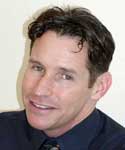-
- Lockyer: State constitution permits laws against same-sex marriage
- Pennsylvania Senate slur prompts apology
- Gay groups want DeMint apology for antigay comments during debate
- Baton Rouge court throws out same-sex marriage ban
- Census data shows many black same-sex couples are raising children
- Bay Area groups seek tolerance for transgender youth
- National News Briefs
- World News Briefs
commentary
Entrapment: Court attributes crime to sex appeal
Published Thursday, 14-Oct-2004 in issue 877
Beyond the Briefs
I’ve described how police often target gay men when conducting so called “sting” operations. Police often use younger handsome male police officers, who appear to be seeking sex, in order to entice gay men into committing crimes that they might not otherwise commit.
The legal defense to such charges is called entrapment. It’s rarely successful, but a recent case in Florida shows that the courts will limit the use of sex when it comes to crimes that are not sexual in nature, such as drug sales.
At his trial, on charges of drug dealing, Julio Blanco described to the court that he was simply a “lonely homosexual man, who was drinking alone at a gay bar, looking for someone to pay attention to him.”
The court went on to provide the back-story: “An extremely friendly and attractive man sat down on the barstool next to him, said his name was Mike, and began paying attention to him....
“Mike asked him if he liked to ‘party’ and Blanco thought party meant having a good time or being sexually involved. Blanco then asked what he meant by party and Mike responded that he liked to have a good time and asked Blanco about cocaine. Blanco refused to get Mike any cocaine, and they continued drinking and talking. Mike was extremely friendly, and then he asked Blanco for cocaine a second time. Again Blanco said no.
“When Mike asked Blanco a third time for cocaine, Blanco became annoyed and started to leave. Blanco told him that if he was looking for drugs, he did not have any. Mike entreated Blanco to stay and said, ‘come on, can you get me some?’ Blanco testified that he was still very interested in Mike because Mike was a very handsome guy. Blanco finally relented and told Mike he would go to the restroom and if he happened to see anybody he knew, he would ask, but that was as far as he would go.
“Blanco saw several friends in the restroom and determined that they had only crystal meth, called ‘Tina.’ He returned to Mike and told him he could not get cocaine but asked if he was interested in Tina. Mike agreed and gave Blanco $60. Blanco left, returned with the drugs, and gave them to Mike. Mike got Blanco a beer and introduced him to his friends. They continued talking and then Mike said that he had to go to Miami. Mike and Blanco exchanged numbers. Mike continued calling him during the following days. Blanco was arrested two weeks later.
“Although Mike told Blanco he was on vacation and had a business in New York, he was actually an undercover detective assigned to the Drug Enforcement Administration (DEA) Task Force. Working in this capacity for approximately nine months, Mike was assigned to the DEA, often with DEA agents and other Federal agencies. Mike testified that he was aware that it was a gay night club and that he and another detective went there because they had received a tip that narcotic sales were occurring at the nightclub. Mike admitted that he had received no information about Blanco and did not know him when he sat down next to him at the bar. Blanco had never previously been arrested.”
“Blanco then asked what he meant by party and Mike responded that he liked to have a good time and asked Blanco about cocaine.”
Blanco sought to have the drug charges dismissed on the grounds that the police actions here were unreasonable.
The trial judge agreed. She said the officer “approached this man who was sitting alone. He was the one that began conversation. If it had been a woman sitting there, I think she would have felt the same way. This was a man who was interested in her or him. The manner of procedure here and the talk.”
And then what followed has been repeated in much of the legal media.
“The whole situation seemed very clear to me,” she said. “I mean, the detective walked in dressed in a T-shirt and jeans, and for the record he was a very attractive man …”
At that point, defense counsel pointed out: “For the record, I would submit he was about 6 foot 2 inches. He was in good shape, you know, a fit individual, young detective, looked to be maybe 30, something like that.”
The prosecutor expressed no disagreement with counsel’s statement.
The judge dismissed the charges against Blanco on the grounds of entrapment. But the state of Florida appealed.
The appellate court affirmed the trial judge’s ruling. The court agreed that the police conduct here involved “using the allure of the possibility of sex to induce one who is under no suspicion of criminal plans or activity to commit a non-sex-related crime that has been instigated and suggested by police.”
|
|
Copyright © 2003-2025 Uptown Publications


